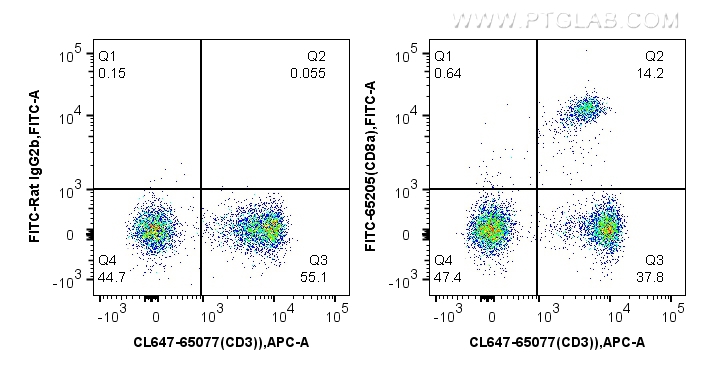验证数据展示
经过测试的应用
| Positive FC detected in | mouse splenocytes |
推荐稀释比
| 应用 | 推荐稀释比 |
|---|---|
| Flow Cytometry (FC) | FC : 0.13 ug per 10^6 cells in 100 μl suspension |
| This reagent has been tested for flow cytometric analysis. It is recommended that this reagent should be titrated in each testing system to obtain optimal results. | |
| Sample-dependent, Check data in validation data gallery. | |
产品信息
FITC-65205 targets CD8a in FC applications and shows reactivity with Mouse samples.
| 经测试应用 | FC Application Description |
| 经测试反应性 | Mouse |
| 免疫原 |
Concanavalin A-stimulated BALB/c splenic T cells 种属同源性预测 |
| 宿主/亚型 | Rat / IgG2b, lambda |
| 抗体类别 | Monoclonal |
| 产品类型 | Antibody |
| 全称 | CD8 antigen, alpha chain |
| 别名 | BB154331, CD8 antigen, alpha chain, Cd8a, Ly 2, Ly 35, Ly B, Lyt 2 |
| GenBank蛋白编号 | BC030679 |
| 基因名称 | Cd8a |
| Gene ID (NCBI) | 12525 |
| RRID | AB_2924135 |
| 偶联类型 | FITC Plus Fluorescent Dye |
| 最大激发/发射波长 | 495 nm / 524 nm |
| 形式 | Liquid |
| 纯化方式 | Affinity purification |
| UNIPROT ID | P01731 |
| 储存缓冲液 | PBS with 0.09% sodium azide, pH 7.3. |
| 储存条件 | Store at 2-8°C. Avoid exposure to light. Stable for one year after shipment. |
背景介绍
CD8 is a transmembrane glycoprotein composed of two disulfide-linked chains. It can be present as a homodimer of CD8α or as a heterodimer of CD8α and CD8β (PMID: 3264320; 8253791). CD8 is found on most thymocytes. The majority of class I-restricted T cells express mostly the CD8αβ heterodimer while CD8αα homodimers alone have been found on some gut intraepithelial T cells , on some T cell receptor (TCR) γδ T cells and on NK cells (PMID: 2111591; 1831127; 8420975). CD8 acts as a co-receptor that binds to MHC class-I and participates in cytotoxic T cell activation (PMID: 8499079). During T cell development, CD8 is required for positive selection of CD4-/CD8+ T cells (PMID: 1968084).
实验方案
| Product Specific Protocols | |
|---|---|
| FC protocol for FITC Plus CD8a antibody FITC-65205 | Download protocol |
| Standard Protocols | |
|---|---|
| Click here to view our Standard Protocols |


